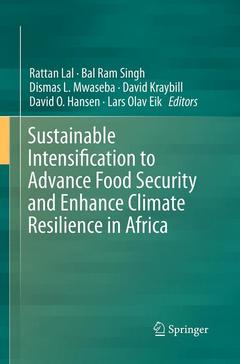Sustainable Intensification to Advance Food Security and Enhance Climate Resilience in Africa, Softcover reprint of the original 1st ed. 2015
Coordonnateurs : Lal Rattan, Singh Bal Ram, Mwaseba Dismas L., Kraybill David, Hansen David O., Eik Lars Olav

Introduction.- 1 Sustainable Intensification for Adaptation and Mitigation of Climate Change and Advancement of Food Security in Africa.- Land Use and Farming System.- 2 Geopedological and Landscape Dynamic Controls on Productivity Potentials and Constraints in Selected Spatial Entities in Sub Saharan Africa.- 3 Land Degradation and Soil Carbon Pool in Different Land Uses and their Implication for Food Security in Southern Ethiopia.- 4 Land use Impact on Soil Organic Carbon and Total Nitrogen Storage in a typical Dry Land District in Tigray, Northern Ethiopia.- 5 Climate Risk Management through Sustainable Land Management in Sub-Saharan Africa.- 6 Effects of Land Cover Changes on Soil Organic Carbon and Nitrogen Stocks in Eastern Mau Forest Reserve, Kenya.- Effects of Climate Change and Crop Yield.- 7 Soil Erosion Hazard under the Current and Potential Climate Change Induced Loss of Soil Organic Matter in the Upper Blue Nile (Abay) River Basin, Ethiopia.- 8 Climate Change and Crop Yield in Sub-Saharan Africa.- 9 Factors in Smallholder Farmers’ Vulnerability to Climate Change Impacts in the Uluguru Mountains, Morogoro, Tanzania.- 10 Using Climate and Crop Simulation Models for Assessing Climate Change Impacts on Agronomic Practices and Productivity.- Soil Nutrient and Water Management For Carbon Sequestration.- 11 Microdosing of Mineral Fertilizer and Conservation Agriculture for Sustainable Agricultural Intensification in Sub-Saharan Africa.- 12 Approaches to Reinforce Crop Productivity under Water-limited Conditions in Sub-humid Environments in Africa.- 13 Effect of In situ Soil Water Harvesting Techniques and Local Plant Nutrient Resources on Grain Yield of Drought Resistant Sorghum Varieties in Semi-arid zone, Tanzania.- Rehabilitation of Degraded Land Through Forestry and Agro-Forestry.- 14 Restoration of Degraded Lands Affected by Salinization Process under Climate Change Conditions: Impacts on Food Security in the River Valley of Senegal.- 15 TreeIntegration In Banana Based Cropping Systems: A Case Study Of Jinja.- 16 Rehabilitation of Degraded Lands: Sustainable Land Management Practices/ Techniques Commonly Used in Niger Republic, West Africa.- 17 Soil Organic Carbon Stocks of Kitonga Catchment Forest Reserve, Tanzania: Variations with Elevation.- Management of Animal Production for Greenhouse Gas Emissions.- 18 Alternative Goat Kid-Rearing Systems for Improved Performance and Milk Sharing between Humans and Offspring in Climate Change Mitigation.- 19 Reducing GHG Emissions from Traditional Livestock Systems to Mitigate Changing Climate and Biodiversity.- 20 Feeding Strategies for Improved Beef Productivity and Reduced GHG Emission in Tanzania: Effect of Type of Finish-feeding on Carcass Yield and Meat Quality of Zebu Steers.- Smallholder Adaptation to Climate Change.- 21 Enhancing Resilience of Food Production Systems under Changing Climate and Soil Degradation in Semi Arid and Highlands of Tanzania.- 22 A Risk-Based Strategy for Climate Change Adaptation in Dryland Systems Based on an Understanding of Potential Production, Soil Resistance and Resilience, and Social Stability.- 23 Use of Conservation Tillage and Cropping Systems to Sustain Crop Yields under Drought Conditions in Zambia.- 24 Sustainable Intensification of Maize and Rice in Small-holder Farming Systems under Climate Change in Tanzania.- 25 Smallholder Adaptation to Climate Change in Semi arid Areas of Tanzania: Experiences from Iramba and Meatu Districts.- Economic, Social and Policy Issues.- 26 Exploring the Meso-level of Agricultural Carbon Finance Projects.- 27 Community, Climate Change and Sustainable Intensification: Why Gender is Important.- 28 Designing Environmental Instruments for Developing Economies under Asymmetric Information: Direct Cost Subsidy versus Tax Cut.- 29 Farming Systems in Tanzania: Empirical Evidence of Changes in Livelihood Patterns and Poverty among Smallholder Farmers.- 30 Carbon Markets Impacts on Farm Management Practices on Mount Kilimanjaro.- 31 Adaptation to Climate Change: Changing Gender relations in Meatu and Iramba Districts in Tanzania.- Conclusion.- 32 Forgotten Facts: Research and Development Priorities.- Appendix.- Working Group Recommendations.
Date de parution : 09-2016
Ouvrage de 665 p.
15.5x23.5 cm
Date de parution : 10-2014
Ouvrage de 665 p.
15.5x23.5 cm
